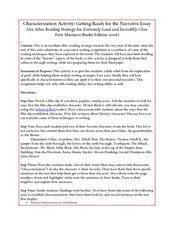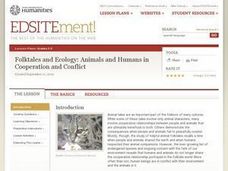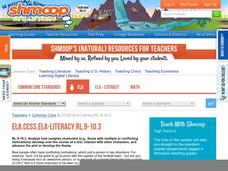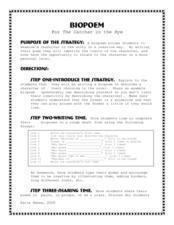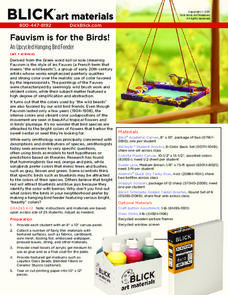Curated OER
Body Biography: The Lion, the Witch and the Wardrobe
Class groups assume the identity of one of the primary human characters in The Lion, the Witch and the Wardrobe. They create a body biography that identifies the most important traits of their character, translate these traits into...
Curated OER
Analyzing Folklore: Redwall
Brian Jacques’ novel Redwall provides the focus for a series of lessons involving the analysis of folklore. Adopting the persona of a character, groups write letters in the voice of their character, assemble a collage using Microsoft...
Hawaiʻi State Department of Education
Characters from a Box
Character analysis is a skill we use when we read literary works or want to write a good story. Learners will use drama to practice character analysis while focusing on the details that make characters act the way they do. They'll each...
Curated OER
Extremely Loud and Incredibly Close: Characterization Activity
Oskar Schell's narrative about his expedition to find out more about his father serves as a model for writers who are crafting their own narratives. Class members choose two characters from the novel and collect examples of the methods...
Curated OER
Folktales and Ecology: Animals and Humans in Cooperation and Conflict
Story elements such as conflict, character analysis, resolution, and moral are discussed and charted as elementary children read folktales involving animals. An element of science is also introduced as learners discover what a keystone...
Shmoop
ELA.CCSS.ELA-Literacy.RL.9-10.3
Focus on complex characters with a lesson from a series that teaches individual skills from the Common Core. Specifically, this resource provides practice with standard RL.9-10.3. Get pupils thinking and talking about characters with the...
Curated OER
The Catcher in the Rye: Biopoem
Here’s a catchy way to study characterization. Readers of The Catcher in the Rye select a character from Salinger’s classic tale to use as the subject of a biopoem. A teacher sample is provided.
Curated OER
In the Billions and Linear Modeling
Your learners analyze population data to discern if it best fits a linear scenario. The idea of change by equal differences over equal intervals is enforced in this real-life task.
Dick Blick Art Materials
Fauvism is for the Birds!
Here's a art project that lets kids use bold colors to express their inner wild beasts, and maybe even attract a few wild birds. Using old picture frames, canvases, and screen mesh, young fauvists craft bird feeders and...
Curated OER
Brave New World: Biopoem
“Words can be like x-rays if you use them properly—they’ll go through anything.” Readers of Brave New World will be pierced by an activity that asks them to use details from the text to craft a biopoem for one of the characters in Aldous...
Curated OER
Freak the Mighty: Chapter 18 Semantic Feature Analysis
Intelligent? Arrogant? Obnoxious? After completing Chapter 18 of Freak the Mighty, individuals fill out a semantic feature chart for characters in Rodman Philbrick's novel. Group members then use their charts to discuss relationships...
Curated OER
The Adventures of Huckleberry Finn: Semantic Feature Analysis
Racist, independent, conflicted? Readers of The Adventures of Huckleberry Finn brainstorm words that describe the traits of characters in Twain’s novel and then rate these qualities in several of their favorite characters. Individuals...



